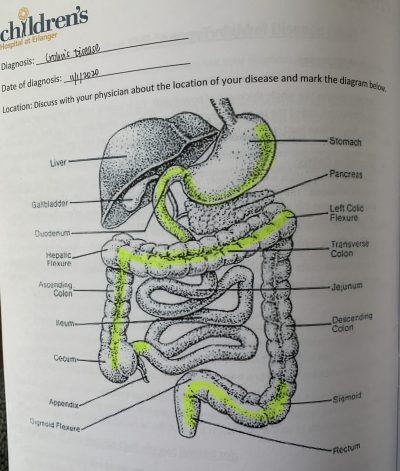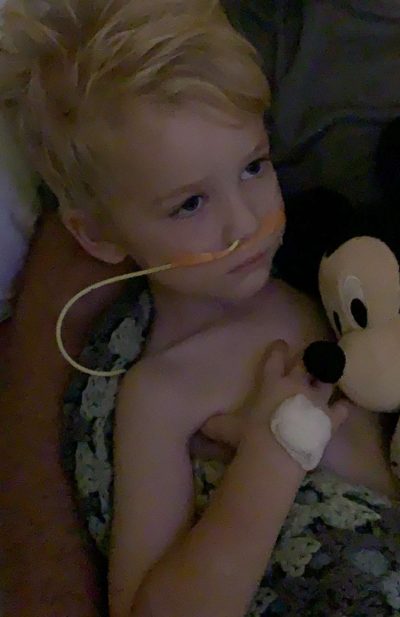
In November 2020, we finally got a diagnosis for our four-year-old after he spent over a month being poked and prodded. He had Crohn’s disease. Our son, Alaric, had soft stool and was a very, VERY, picky eater since he was about two. We assumed the soft stool was from his eating habits and his eating habits were just a phase; we now know this was probably because of his disease. Then at the beginning of October of 2020, he started having a low grade fever. The fever ranged from 99F to around 104F the whole month. He also started losing weight and was eight pounds down by the time of his diagnosis, had even softer stool, and was throwing up almost nightly. He had many x-rays, COVID-19 tests, a sonogram, and lots of blood tests, all leading to no answers. His doctor decided to admit him to our local children’s hospital until we had answers. This is when we did some more tests and he ended up getting an upper endoscopy and colonoscopy.
Watching our four-year-old go through this was one of the hardest things I have ever had to do. He had gotten so skinny and looked so fragile, he was terrified of all medical personnel and even yelled “you’re mean” at one of the nurses. It was heartbreaking.
In hopes of helping others who might find themselves going through something similar, I’m sharing some tips that I have learned on this journey:

1: Everyone’s journey through IBD is different. My son’s main symptom was a fever. There are so many different symptoms however, so not everyone will experience the same ones. Most IBD patients are diagnosed between the ages 15 and 30, early onset is between the ages of 6-15 and very early onset is anyone under 6. If your child is younger than 6, it’s hard for them to know how to express the pain they are feeling.
2: Trust your gut. When my son started having a fever, I knew something wasn’t right; I could feel it. All the tests were coming back negative and the doctors kept wanting us to wait it out to see if it was “just a bug.” Then, when we were hospitalized, they said we could go home if we wanted to wait for the tests, but we decided it would be best to stay. If we hadn’t stayed, it would have taken much longer and his disease could have gotten much worse.

3: Everyone grieves differently. When we were first told our son had IBD, I was relieved that we finally had a diagnosis. And then I was overwhelmed. My four-year-old was diagnosed with a chronic, lifelong, autoimmune disease, a disease I knew nothing about. My way of grieving was to dive into research on Crohn’s disease. Learning more about it has helped me not feel as overwhelmed.
4: Surround yourself with support. If your child has a chronic illness or disease, I highly recommend finding support groups. Facebook has a few pediatric Crohn’s disease groups that are filled with parents with kids who are in the exact place I am in, experienced parents, grandparents, and even some kids that are now older who are helping give their point of view. My son has a great GI team, and my family and friends have been so supportive through this whole process.
No one wants to hear there is something wrong with their child, especially a lifelong chronic illness. The main advice I was given is to take it day by day. This isn’t easy, but it’s been necessary for us. Right now, my son is doing great. We are still figuring things out, but we’re always learning and moving forward.






















